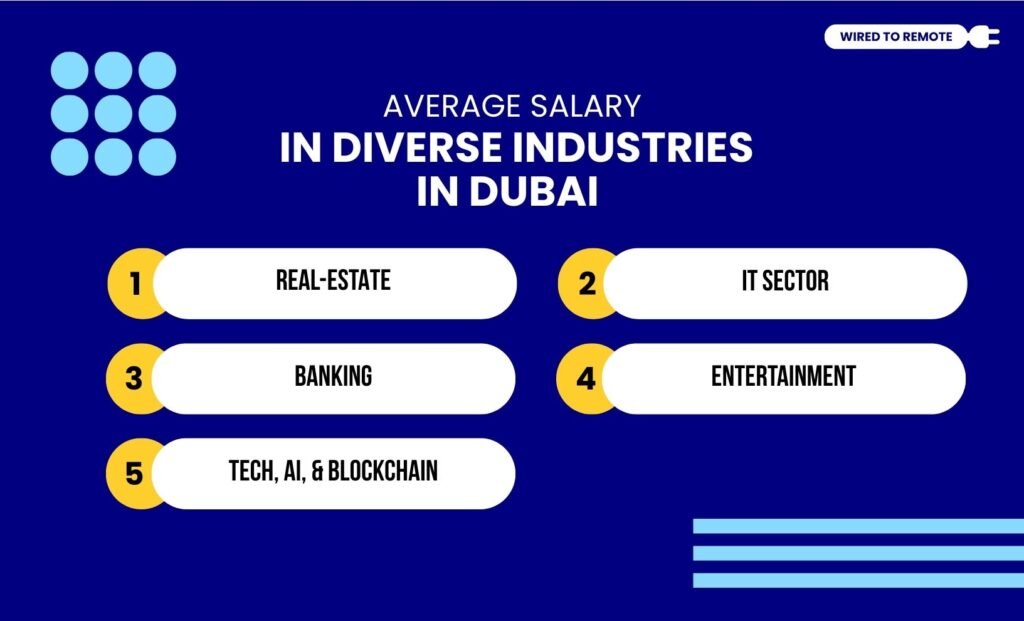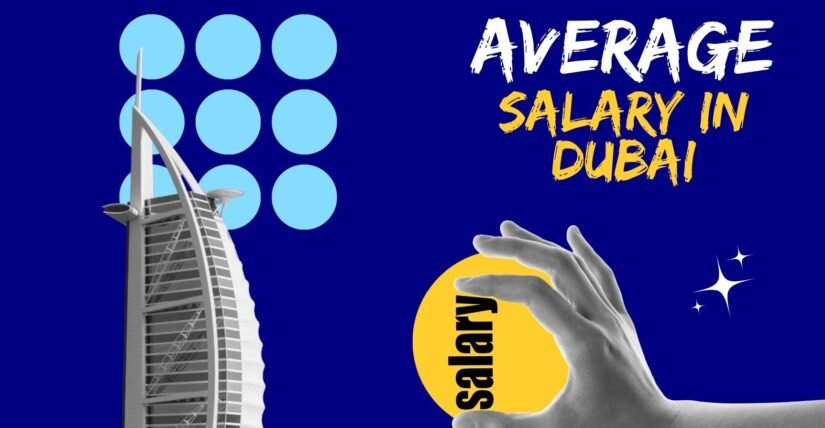- Dubai is a global industrial hub offering various tech-based remote job roles to the global workforce.
- It is preferred by both remote workers and digital nomads for its high employee compensation package and affordable living expenses.
- The average salary in Dubai’s various sectors differs based on the work roles and employees’ qualifications and work experience.
Among the top countries, the UAE has become an industrial hub. Attracting talent from across the world to bridge the gap between employers and employees.
From software developers to real estate experts, it offers remote work opportunities for a diverse workforce. So, it is considered one of the best countries for digital nomads.
But among the numerous places in the UAE, Dubai holds the number one position for remote work opportunities. It offers tech-based job roles in a variety of sectors.
Moreover, perks like affordable living and high compensation packages make it an attractive choice for remote professionals planning to become a digital nomad.
But before finalizing the decision, it’s better to have a clear idea about the average salary in Dubai for different professions. So, it is easier to choose the best-paying remote jobs.
In this blog, I am going to delve into the diverse aspects of the average salary structure in Dubai by focusing on—
- How the average salary differs for different factors,
- Top high-paying jobs,
- Average salary for specific sectors, and more.
So, come dive right in!
What Is The Average Salary In Dubai?
As a city with revolutionary innovation and an increasing economy, Dubai’s average base salary amounts to around 186,297 (AED). So, it offers a good pay scale for most of its employees.
But the average salary is not the same for all kinds of professions. So, based on the complexity of work, industry standards, experience, and qualifications of employees, it can differ.
How Does Average Salary Differ With Qualification And Experience?
Based on the typical factors of the employees, the average salary can change.
So, depending on how much experience one has and their educational qualification, they can earn different salary packages.
Experience
Unlike other cities in the UAE, job roles based in Dubai prioritize work experience a lot. So, based on the years of experience, the average salary in Dubai can vary.
- Below 5 years: Workers with less than 5 years of experience typically earn 32% more than the freshers.
- 5-10 years: Employees having 5 to 10 years of working experience earn 36% more than their junior colleagues.
- Above 10 years: Professionals with over 10 years of work experience earn 21% more than those with 5-10 years of experience.
Qualification
In 2013, the Labor Ministry of the UAE approved the minimum wages for different categories of employees, based on their skills and educational qualifications.
- University Graduates: The average salary of university graduates can go up to AED 12,000 per month, which is equal to $3,260 monthly.
- Skilled Technicians: Also, if the worker has technical skills to handle complex projects, they can earn nearly an average of AED 7,000 per month. That is, around $1,900 monthly.
- Skilled Workers With Secondary School: Finally, those who are skilled but have secondary schooling can earn, on average, a monthly salary of AED 5,000. That is, around $1,300 per month.
Top 10 High-Paying Remote Jobs In Dubai
Here is a list of the highest-paying remote roles in Dubai.
| Remote Work Roles | Average Salary Per Annum (AED) |
|---|---|
| Financial Accountant | 45,000 – 50,000 |
| Remote Doctor | 200,000 – 950,000 |
| Software Developer | 420,000 – 450,000 |
| Software Engineer | 200,000 – 500,000 |
| Chartered Accountant | 100,000 – 600,000 |
| Digital Marketing Manager | 180,000 – 200,000 |
| Human Resource Manager | 15,000 – 35,000 |
| CEO of Businesses | 600,000 – 700,000 |
| Legal Assistant | 45,000 – 60,000 |
Why Choose Dubai For Remote Work?

Among the countless reasons for choosing Dubai remote work roles, the employee benefits and living expenses are the primary ones.
Employee Benefits
Unlike other places, it is mandatory in Dubai to provide employee benefits, incentives, and a fair and safe work environment. So, some of these employee benefits include—
- Retirement plans offering general pensions to employees over the age of 60.
- Mandatory maternity leave policy for female workers for up to 45 days.
- Paying timely salaries with bonuses and incentives for employee performance.
- Providing health insurance and unemployment insurance to support workers during emergencies.
Living Expenses
Since the living expense completely depends on one’s choice of lifestyle, family size, and preferences, it vary from person to person. But overall, living in Dubai is quite affordable.
Unlike other countries for digital nomads, Dubai offers comparatively low rental housing and reasonable pricing for groceries and three-course meals. So, it is affordable for digital nomads.
In addition to this, most of Dubai’s medical treatment is covered by the company’s health insurance policies. Also, the utilities and other expenses are towards the lower range of expenses.
Average Salary In Diverse Industries In Dubai

Some of the major industries in Dubai that contribute to the city’s economy from remote work help in driving innovation. So, here are the average salaries of these diverse sectors.
1. Real-Estate
Given that Dubai is all about luxurious buildings and skyscrapers, it attracts global investors. So, to handle them, many companies hire remote agents. And, the average salary in the sector ranges from AED 60,000 to 130,000.
2. IT Sector
Unlike other countries, Dubai is a technological hub. So, it provides remote work for software development, cybersecurity, and digital transformation roles. And, the average salary for these IT professionals ranges from AED 120,000 to 300,000.
3. Banking
By hosting banks, financial institutions, and investment firms, Dubai has become one of the major financial centers. Moreover, it offers remote banking roles to foreigners for managing the financial processes, offering an average salary of AED 90,000 to 95,000.
4. Entertainment
Dubai’s entertainment industry encompasses mass media production, advertising, events planning, and film production. So, it hires remote workers to digitally cover most of them. Providing an average salary range of AED 50,000 to 70,000.
5. Tech, AI, And Blockchain
Finally, as a leading tech-driven, innovative city, Dubai offers countless remote positions in the tech, AI, and blockchain sectors. So, attracting global investors with innovation and workers with an average salary of AED 300,000 to 450,000.
Things To Keep In Mind While Choosing Dubai Remote Jobs
Having a keen knowledge of the average salary in Dubai’s various sectors is quite essential for every aspiring digital nomad. But only knowing the salary range is not enough.
So, here are a few considerations to keep in mind before choosing a remote role in any of the Dubai sectors—
- Knowing the work culture and work hours for the specific role in the industry.
- Understanding the transportation needs and housing options for digital nomads.
- Getting proper visas meant for digital nomads to start working remotely in Dubai.
With these key considerations and the idea about the average salaries, you can start your digital nomad lifestyle today.
So, what’s the wait for? Get informed and pack your bags to start working for the global industrial hub.
FAQs
Here are some of the most frequently asked questions that you can check.
Even though there is no single minimum salary range for all kinds of remote roles in Dubai, the Labor Ministry has mentioned the minimum salary for specific types of employees. So, university graduates get AED 12,000, skilled technicians get AED 7,000, and skilled workers with secondary school get AED 5,000.
Generally, a good salary is subjective and differs from person to person. But a general salary range of around AED 10,000 to AED 15,000 is considered good. As it decently covers the average living expenses in Dubai.
There are a few factors that directly influence the average salaries in Dubai. So, some of them include—
• Educational qualification and work experience
• Industry demand and type of company
• Specialization roles in the field
• The broader economic cycle of the city
• The company’s profit margin.





Leave A Comment